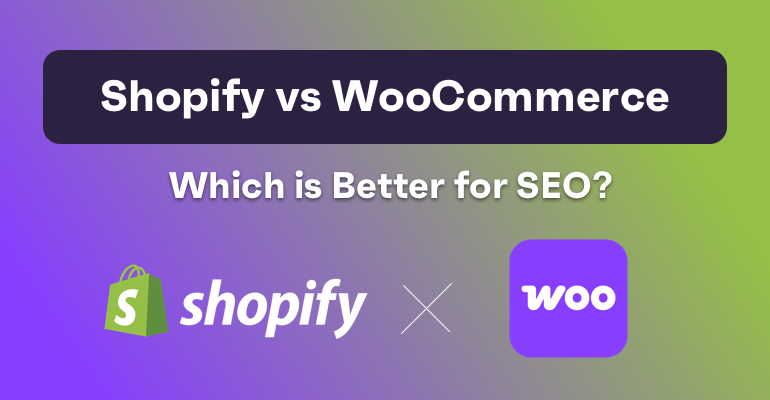When choosing an eCommerce platform, SEO (Search Engine Optimization) plays a crucial role in determining your store’s visibility in search engines like Google. Shopify and WooCommerce are two of the most popular eCommerce solutions, each offering unique features for SEO. In this article, we will compare Shopify vs WooCommerce from an SEO perspective to help you determine the best option for your business.
1. SEO Features Comparison: Shopify vs WooCommerce
Both Shopify and WooCommerce come with built-in SEO features and allow for further optimization through apps and plugins. Below is a breakdown of their key SEO features:
| SEO Feature | Shopify | WooCommerce |
|---|---|---|
| Customizable URLs | Limited | Fully customizable |
| Meta Titles & Descriptions | Available | Available |
| Structured Data Support | Requires app | Can be added via plugins |
| XML Sitemaps | Automatic | Needs a plugin (Yoast SEO) |
| Page Speed Optimization | Good | Depends on hosting |
| Mobile Optimization | Yes | Yes (depends on theme) |
| SSL Certificate | Included | Depends on hosting |
| Blog Support | Yes | Yes (WordPress-based) |
| Canonical Tags | Automatic | Manual or via plugin |
2. URL Structure & Customization
Shopify has a rigid URL structure, meaning that category and product URLs follow a predefined format (e.g., /collections/ for categories and /products/ for products).
WooCommerce, on the other hand, allows full URL customization, enabling better control over keyword usage in URLs, which is a crucial SEO ranking factor.
Example:
- Shopify:
https://yourstore.com/collections/shoes - WooCommerce:
https://yourstore.com/shoes
Verdict: WooCommerce wins due to its flexibility in URL customization.
3. Page Speed & Performance
Page speed is an important SEO ranking factor. Shopify is a hosted solution, meaning it has optimized servers, built-in caching, and a global CDN (Content Delivery Network) to ensure fast loading times.
With WooCommerce, page speed depends on hosting. Choosing a fast and reliable hosting provider (such as SiteGround, Kinsta, or WP Engine) along with proper caching (via WP Rocket or W3 Total Cache) is essential for high performance.
Example:
A Shopify store might load in 2 seconds, while a WooCommerce store on slow hosting may take 4+ seconds to load.
Verdict: Shopify wins in page speed if the WooCommerce site is not optimized correctly.
4. Mobile-Friendliness & User Experience
Both platforms support mobile-friendly themes. Shopify themes are optimized out-of-the-box, while WooCommerce requires selecting a responsive theme (like Astra, GeneratePress, or Flatsome).
Google prioritizes mobile-first indexing, meaning a mobile-optimized website ranks better in search results.
Verdict: Shopify has a slight edge due to pre-optimized themes.
5. Blogging Capabilities
Content marketing through blogging is one of the best SEO strategies. Shopify has a basic built-in blogging system, while WooCommerce is built on WordPress, the best CMS for blogging and content marketing.
Example:
With WooCommerce, you can use plugins like Yoast SEO to optimize blog content, add schema markup, and manage keywords efficiently.
Verdict: WooCommerce wins due to WordPress’s superior blogging features.
6. Structured Data & Rich Snippets
Structured data helps search engines understand your content better, leading to rich snippets in search results. WooCommerce allows easy structured data implementation using plugins like Rank Math or Yoast SEO.
Shopify requires third-party apps for schema markup, which may involve additional costs.
Example:
- WooCommerce (Using Yoast SEO): Displays product ratings, prices, and stock availability in search results.
- Shopify: Requires an app like JSON-LD for SEO to enable rich snippets.
Verdict: WooCommerce wins due to better structured data support.
7. Security & SSL
Security is vital for SEO since Google favors secure websites (HTTPS). Shopify provides a free SSL certificate and manages security updates automatically.
With WooCommerce, security depends on your hosting provider. Some hosts offer free SSL, but keeping your site secure requires additional plugins like Wordfence.
Verdict: Shopify wins in security due to its managed hosting.
8. SEO Plugins & Apps
WooCommerce benefits from powerful WordPress SEO plugins, such as:
- Yoast SEO – Comprehensive SEO management
- Rank Math – Advanced SEO features with structured data support
- All in One SEO – Alternative to Yoast with additional features
Shopify offers SEO apps like:
- Plug in SEO
- SEO Booster
- Smart SEO
However, Shopify’s SEO apps often come with additional costs, while most WordPress SEO plugins have free versions with extensive features.
Verdict: WooCommerce wins with better SEO plugin options.
9. Cost Comparison
Shopify requires a monthly subscription ($29–$299), plus transaction fees if you don’t use Shopify Payments.
WooCommerce is free but requires hosting (~$10–$30/month), domain costs, and optional paid plugins.
Verdict: WooCommerce is more cost-effective for long-term SEO investment.
Conclusion: Which is Better for SEO?
Shopify is better for:
✅ Fast-loading websites with minimal setup
✅ Automatic SSL & security updates
✅ Built-in CDN for performance
WooCommerce is better for:
✅ Full control over SEO settings & URLs
✅ Better blogging & content marketing
✅ Advanced SEO plugins & structured data support
✅ Cost-effective in the long run
If you want a hassle-free solution with good SEO capabilities, Shopify is a great choice. However, if you need full SEO control and a content-driven strategy, WooCommerce is the better option.
How XHTMLTEAM Ensures SEO Optimization
At XHTMLTEAM, we follow best SEO practices in our code to ensure:
- SEO-friendly website structure & URLs
- Optimized speed & performance
- Mobile responsiveness
- Schema markup implementation
- Improved Core Web Vitals for better rankings
Need a Shopify or WooCommerce store that ranks high on Google? Contact XHTMLTEAM for expert web development services!

